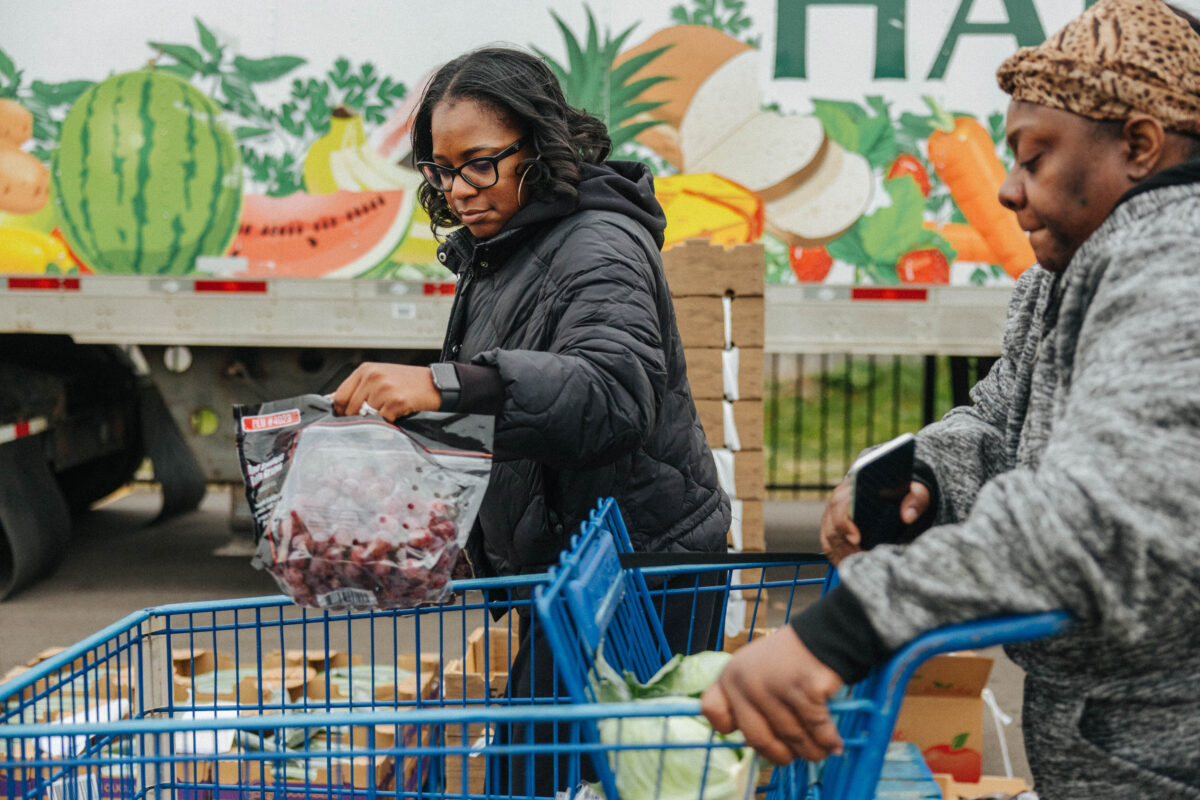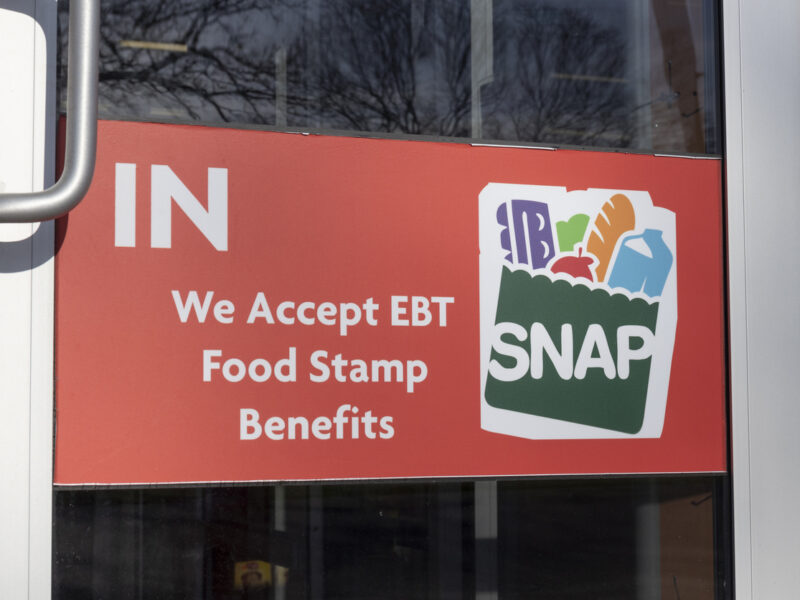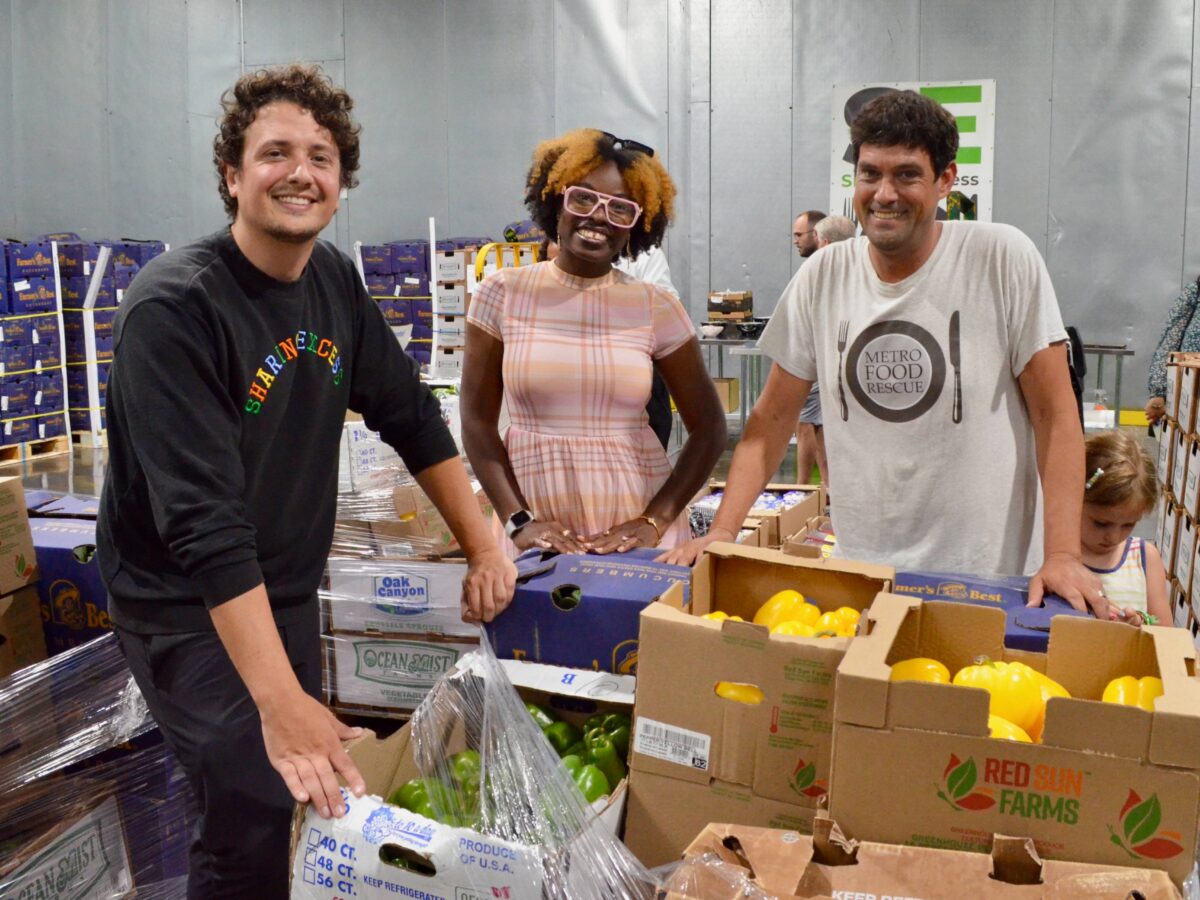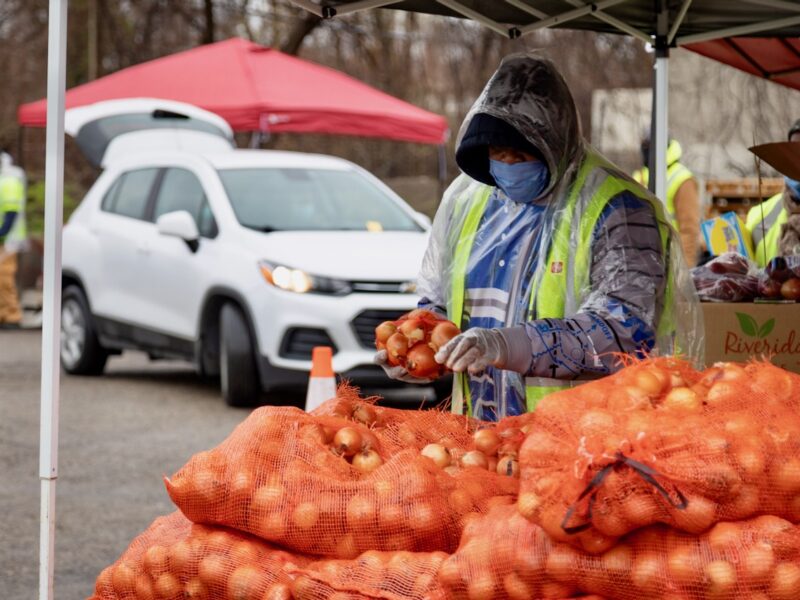Overview:
- The state says it will begin paying partial November SNAP benefits beginning Saturday.
- The SNAP pause, plus layoffs and the high cost of living, has created a “perfect storm of hungry people … scared people," says LeJuan Council of Feed Your Neighborhood.
- Read on for Planet Detroit's tips on civic next steps you can take to fight hunger in the community.
As 42 million Americans – and 1.4 million Michiganders — cope with a pause in Supplemental Nutrition Assistance Program aid during the federal shutdown, Detroit organizations and mutual aid networks such as community fridges and food rescue operations are working to make up the difference.
Over two-thirds of Detroit households experience food insecurity, and nearly 40% rely on SNAP, according to the Detroit Food Policy Council. Urban farms and food pantries have long operated as a safety net in the city, distributing free or low-cost meals and produce all year round.
Detroit city officials allocated $1.75 million in emergency funds to 100 of the city’s food pantries, and set up a volunteer drive to register residents to assist those pantries in their food distribution efforts over the weeks ahead.
President Donald Trump’s administration said Monday that it would partially fund SNAP for November, after two judges issued rulings requiring the government to keep the nation’s largest food aid program running.
Michigan SNAP recipients who normally receive benefits on the third, fifth, or seventh of the month will receive a partial allotment — about 50% of their benefit payments for the month of November — Saturday, Nov. 8, according to a Wednesday statement from the Michigan Department of Health and Human Services.
All other SNAP recipients will receive partial benefits on their normally scheduled date, the department said. If additional court action results in further changes to the payment of partial benefits beginning Saturday, MDHHS said it would provide updated information.
Detroit SNAP recipient pens essay: ‘I don’t want people to feel like they have to hide themselves away’
In the weeks leading up to the missed SNAP payments, Cherise Morris said she couldn’t help but notice increased stares as she used her Double Up Food Bucks coins to buy produce at Eastern Market.
As fears grew over the Nov. 1 cutoff date, Morris, a writer and SNAP recipient based in Southwest Detroit, penned a personal essay. The article, posted on her Substack, was written days before the Nov. 1 federal pause and draws on her own experiences.
“I felt shame using food stamps as a child, and I still feel shame today using them as a mother,” Morris wrote. “There are people who are poor for many reasons. There are many reasons why people use SNAP benefits and none of us should have to rationalize our existence.”
Morris said she wrote her essay to destigmatize SNAP and show others that solidarity and relationship-building is vital in this moment and beyond.
“I don’t want people to feel like they have to hide themselves away,” Morris, 32, told Planet Detroit.
“I know all the people who have SNAP because we all go to the office and get our tokens and stuff. And I see so many people from so many different walks of life.”
SNAP has an annual income limit of roughly $42,000 for a household of four. Morris said she believes more families could apply for SNAP than the public realizes. One-fifth of Detroit households that are eligible for the food assistance program never apply, according to a 2023 report from the Detroit Food Policy Council.
As a child, Morris grew up on SNAP; when it came time for her to start her own family, she knew she would have to rely on the benefits program to support herself and her kids.
“If you’re having children and you’re making less than $100,000 a year … it is hard to keep up with the cost of childcare,” she said.
“Not only do I not have a family that can help me out financially, but my mom is a senior citizen. She can’t work anymore. She’s on SNAP. In fact, I’m helping her with groceries this month.”
Detroit’s urban farmers mobilize free produce
A caravan of cars wrapped around the corner of Mack Avenue and Conner Street Monday afternoon as hundreds of Metro Detroit residents waited to receive free food from one of Forgotten Harvest’s mobile food distribution sites.
It’s a familiar scene for east side Detroiters, who congregate at the location every first and third Monday of the month.
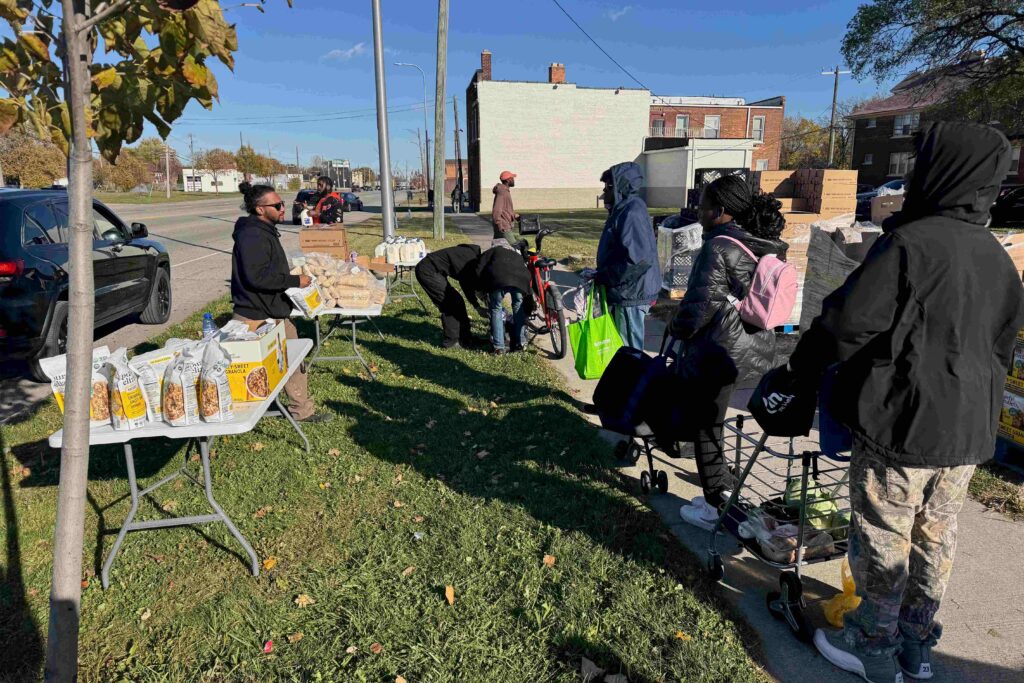
LeJuan Council, who organizes the mobile food pantry, remembers driving with her father to Detroit’s Eastern Market every Saturday to purchase produce and give it out to the community for free when she was as young as 7.
The experience made an impact on Council, who went on to volunteer at food banks for years before founding Feed Your Neighborhood, a grassroots organization that tackles food access, education, and housing issues for residents on the east side of Detroit, in 2017.
“We just give out free food, no questions asked,” said Council, who lives in Detroit’s Jefferson Chalmers neighborhood. “That restores dignity for people that may not have the bandwidth to apply for SNAP.”
Among some of the city’s urban farms, the SNAP pause spotlights a broader mission to make Detroit a food sovereign city, capable of feeding residents healthy and culturally relevant food all year long.
On Saturday, Dolores Perales and a handful of volunteers were spending the afternoon harvesting the last herbs and vegetables from the growing season. Cadillac Urban Gardens, a 1-acre farm, has offered as much as 5,000 pounds of free produce each year to Southwest Detroit residents.
“Residents are struggling every single day, every single moment, every single year, and those struggles can oftentimes get worse and worse, and when things like SNAP get cut, it only just exacerbates the problem,” said Perales, co-executive director of Cadillac Urban Gardens.
In a 2022 survey, Cadillac found that less than half of the respondents who received produce from the urban garden earned under $45,000. For many community members, the organization is another lifeline to supplement the costs of food.
“Community gardens can only do so much, but we are a point in the community, and we are anchors in the community that can help and support and get people the produce and items that they need at a localized level,” Perales said.
For urban growers like Perales and Amanda Brezzell of Fennigan’s Farms, eliminating barriers to fresh food is a year-round commitment.
“We started doing this because people in our community were starving and we wanted to feed them,” said Brezzell, who is co-director and lead farmer at Fennigan’s, located in Dexter-Linwood on the city’s west side.
The farmstead regularly offers fruits and vegetables that Brezzell and the small team of farmers grow during the summer.
“We see a lot of people walking down the street in our neighborhood – houseless people with shopping carts. Sometimes we catch people on the way to the grocery store and we tell them on their way back from the grocery store to come back and pick things.”
Free food access is foundational for Fennigan’s, and the farm maintains its offering of free produce with revenue from other services such as design work and floral sales.
“There are pantries, kitchens, farms, community fridges, and all of those who have been taking care of the community and have built out systems to give to communities in need whether SNAP is running or not,” said Brezzell.
Brezzell said she hopes the pause in SNAP benefits encourages others to connect with grassroots efforts and embrace the work of the city’s urban farms.
“We, as socially disadvantaged people, have to build class solidarity to the point we have a whole system that is prepared to serve us outside of a system that is literally starving us.”
Efforts to feed Detroiters who are going without SNAP benefits have grabbed local and national attention.
Travis Peters, an urban farmer, military veteran, and community organizer, went viral after posting on social media Oct. 23 that he would offer his farm produce for free.
The nonprofit Keep Growing Detroit launched a “Take What You Need, Pay What You Can” initiative at its weekly produce stand at Eastern Market for the remainder of November.
Feed Your Neighborhood’s Council said the overlap of the SNAP pause, coupled with job layoffs and the high cost of living, has created a “perfect storm of hungry people … scared people.”
“The thought that they can do that and they can do that at any time is going to change people.”
Community fridges, food rescues team up to provide 24/7 food access
Most days of the week, you can spot Belinda Gilmore stocking or cleaning up around a fridge stationed at Field Street and Kercheval Avenue, one of the main thoroughfares between the city’s lower east side and the affluent Grosse Pointe suburbs.
All year long, Gilmore said she sees consistent foot and car traffic by the community fridge. The fridge takes in food — canned goods, fruits and vegetables, and prepared meals — from food rescue operations, local businesses, and residents. In the last several months, Glimore said she’s seen more people trickle in, driven by the rising cost of living.
“People are working two jobs, (have) children, and still need to go to a refrigerator for food,” said Gilmore, lead organizer of the Field Street Community Fridge in Detroit’s Islandview neighborhood.
“We know that things are going to get worse,” Gilmore said. She bases that opinion on the number of people who come to the community fridge and complain about cutbacks, she said.
“The numbers are going to increase exponentially.”
More folks that stop by the fridge, Gilmore added, are looking to meet their major grocery needs like dairy or meat, not to supplement their grocery needs. Last week, someone donated 18 gallons of milk to the fridge, and it was gone within 30 minutes, she said.
“That gives me the impression that people are looking for a complete offering of food, like a supermarket,” she said.
“We get what is given to us, and sometimes the protein is not shared with us. So I’m encouraging people, if you can walk through every few days or you’re driving by every few days, you might be able to get more of what you need by doing that.”
What makes grassroots mutual aid projects like Detroit Community Fridge successful, Gilmore said, is that it relies on “groups who are equally as committed.” Those organizations, she adds, need the entire neighborhood to buy in and invest their time and resources.
“It’s not just about the people you see there doing this and that,” said Gilmore. “It’s also about you helping your neighbor … your community.”
Metro Detroit’s network of community fridges has rapidly expanded in the last year.
That work is being partially backed by Food Rescue US – Detroit, a local chapter of a national organization that rescues food from local businesses and major grocery chains. The organization’s Fridge the Gap initiative recently helped expand community fridge locations across the country.
“When the community is already very strong, then we feel like the success of the community fridge is more guaranteed,” said Darraugh Collins, site director for Food Rescue US – Detroit. “People will help to keep it a safe and clean and dignified experience.”
Morris, the writer and SNAP recipient, said she hopes this crisis spurs others to volunteer or join grassroots organizations in their community, such as Hey Y’all Detroit, a nonprofit that supplies food to Detroit residents by stocking local community fridges and pantries and operating free farmers markets.
“In impoverished communities, people have to lean on one another to survive,” said Morris.
When SNAP benefits resume, they won’t be enough, Morris said.
“They’ll be just as bad as they were before, because what we accepted as normal for so long is simply not good enough.”
🗳️ Civic next steps: How you can get involved
Why it matters
⚡ Nearly 40% of Detroit households rely on SNAP, while over two-thirds of households experience food insecurity. The federal SNAP freeze impacts many residents’ ability to access groceries amid the federal shutdown.
How to take civic action now
- 🫂 Volunteer at your local food bank, mobile pantry, or community fridge, or register online with the city of Detroit at this link. Belinda Gilmore of Field Street Community Fridge welcomes “anybody to help out on a regular basis, washing the fridge and freezer, picking up debris when you see it on the ground.” On top of food donations, the fridge could use cleaning supplies, trash bags, and soap.
- 📅 Attend the Fennigan Farms end-of-season bonfire on Sunday, Nov. 9 at 3014 Monterey in Detroit. Brezzell says the farm would “love to be able to be connected with people who have surplus food or chefs and volunteers willing to cook hot meals and do food distribution” moving forward.
- 👋 Visit local food sovereignty organizations such as Keep Growing Detroit and D-Town Farm, or visit your nearest community garden or urban farm, such as Cadillac Urban Gardens.
- 🥫 Donate nonperishable canned goods, fresh produce, prepared meals, and hygiene products at your local community fridge 24/7. Find your nearest fridge via this link. Local businesses and restaurants can donate leftover meals and goods to community fridges, says Collins of Food Rescue US – Detroit. Any food donations in good faith are protected from liability by the Bill Emerson Good Samaritan Act.
- 📍Search for your nearest food pantry using the city of Detroit’s Food Pantry Finder or PantryNet.org’s Food Map.
- 📱 Call Michigan’s 211 helpline for information on food assistance programs near you.
- 📦 Adults over the age of 60 can use the Commodities Supplemental Food Program (CSFP), which provides a monthly food box to recipients.
What to watch for next
🗓️ The Michigan Department of Health and Human Services says partial November SNAP benefit payments will begin Saturday.
Civic impact
🌍 Food insecurity is an ongoing issue in Metro Detroit, and getting involved in local food distribution operations or urban agriculture work is just one way to address this systemic issue.
⭐ Please let us know what action you took or if you have any additional questions. Please send a quick email to connect@planetdetroit.org.
MORE REPORTING FROM PLANET DETROIT
With SNAP benefits gone, Detroit rolls out emergency food sites
With federal SNAP benefits expired, Detroit Mayor Mike Duggan allocates $1.75 million to bolster local food pantries, aiming to shield vulnerable residents from food insecurity. The city has initiated a volunteer drive to support food distribution efforts.
Detroit food rescue partnership kicks off with 617,000 pounds of produce in 2 months
Sharing Excess, a Philadelphia-based organization that redistributes surplus food, and West Bloomfield Township-based Metro Food Rescue are collaborating to rescue up to an estimated 5 million pounds of fruits and vegetables annually for people in need. The two nonprofits headquartered in a Delray warehouse where they will sort and repack surplus produce rescued from vendors…
USDA cuts rattle Detroit’s ‘resilient’ food pantries
In Detroit, a food distribution event at Pilgrim Baptist Church has been a lifeline for hundreds of families for over a decade. Recent cancellations of $4.3 million in state food bank orders due to USDA spending reshuffles have cast uncertainty over its future.

